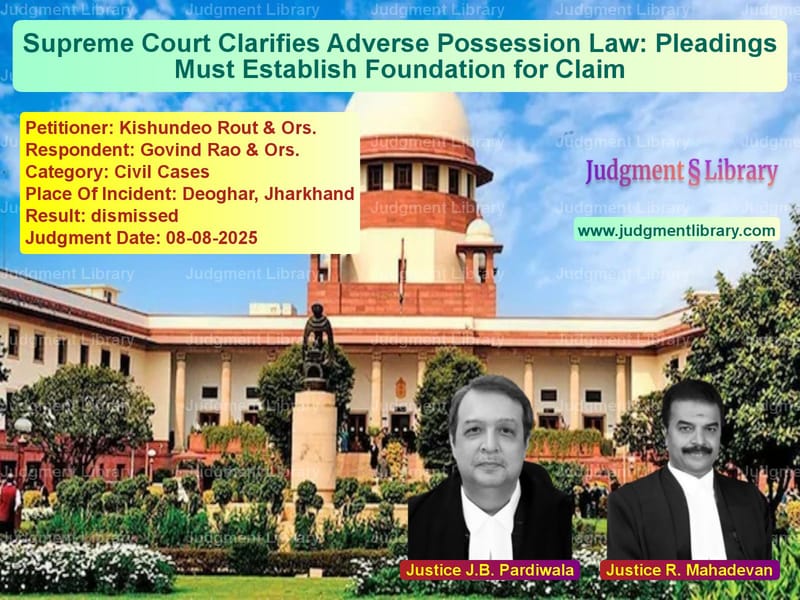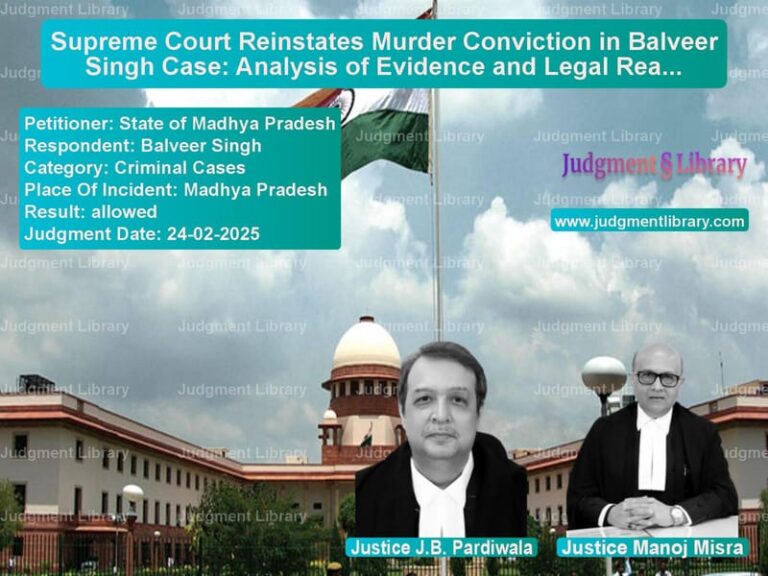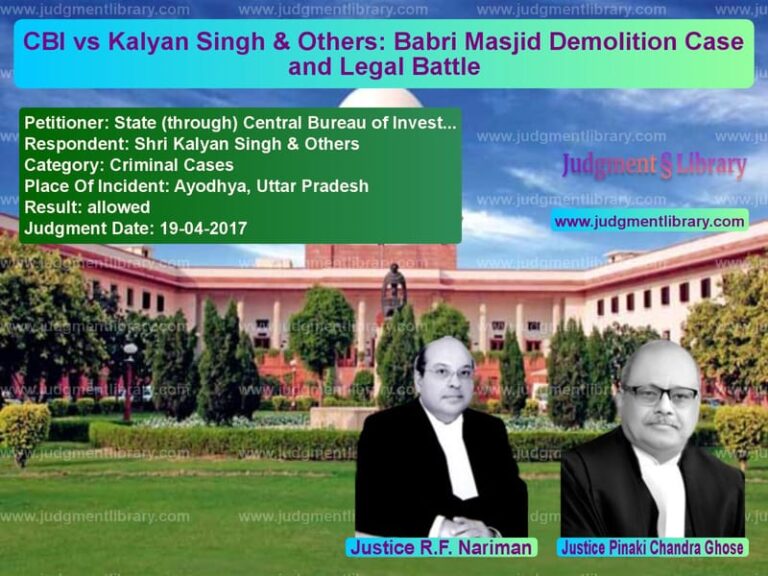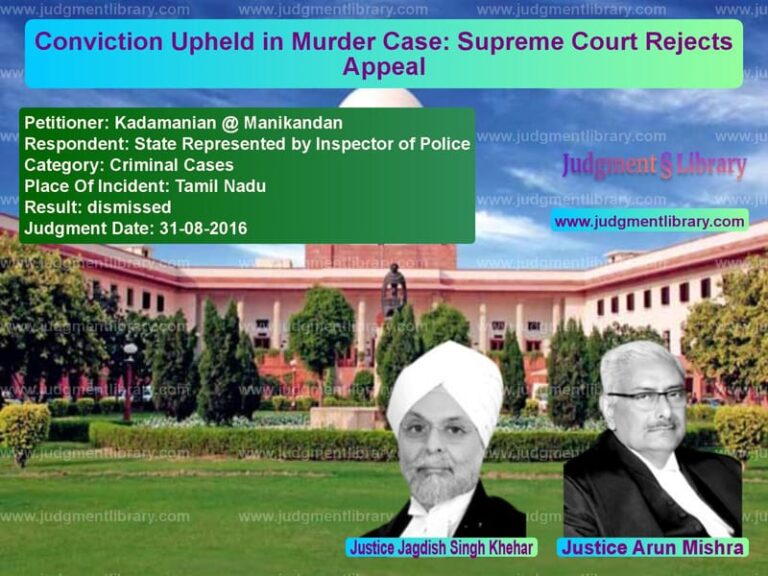Supreme Court Clarifies Adverse Possession Law: Pleadings Must Establish Foundation for Claim
In a significant ruling that clarifies the legal requirements for claiming property through adverse possession, the Supreme Court of India has delivered a judgment that reinforces the fundamental principles of civil procedure and property law. The case involved a protracted legal battle over property rights in Deoghar, Jharkhand, where the central question was whether a court can grant relief based on adverse possession when the claimant never raised this argument in their original pleadings.
The dispute began in 1999 when Kishundeo Rout and others filed a title suit seeking to declare a sale deed as bogus and inoperative. The plaintiffs claimed that a property transaction involving Sudama Devi was fraudulent and sought cancellation of the sale deed. What followed was a legal journey through three levels of courts, with each court reaching different conclusions based on the same set of facts, ultimately leading to a crucial Supreme Court ruling on procedural law and property rights.
The Legal Journey Through Three Courts
The case presented a fascinating example of how different courts can interpret the same facts differently. The trial court initially dismissed the plaintiffs’ suit, finding that they had failed to prove their allegations of fraud and misrepresentation in the property transaction. The court concluded that the sale deed was valid and that the plaintiffs had not established their case.
However, the first appellate court took a dramatically different approach. The District Judge framed an additional issue regarding adverse possession, even though this claim had never been raised in the original pleadings. The appellate court declared that “the adverse possession of the plaintiffs have already ripened against the defendants in year 2012” and decreed the suit in favor of the plaintiffs based solely on this newly introduced legal theory.
The High Court of Jharkhand, hearing the second appeal, strongly disagreed with this approach. The High Court formulated two substantial questions of law: whether the appellate court was justified in framing the additional issue of adverse possession when it was never pleaded, and whether such an issue could be decided without further evidence. The High Court answered both questions in the negative, observing that “there was no foundational pleading with regard to claim of title by adverse possession of the property.”
The Supreme Court’s Analysis of Adverse Possession Law
The Supreme Court, in its detailed analysis, reinforced the fundamental principle that legal claims must be properly pleaded before they can be adjudicated. Justice J.B. Pardiwala, writing for the bench, emphasized that “the foundation for the plea of adverse possession must be laid in the pleadings and then an issue must be framed and tried.”
The court explained that adverse possession is not merely a legal technicality but requires specific factual assertions that must be proved through evidence. “A person who claims adverse possession must show on what date he came into possession, what was the nature of his possession, whether the factum of his possession was known to the legal claimants and how long his possession continued. He must also show whether his possession was open and undisturbed,” the court noted.
The judgment extensively reviewed historical precedents, including a full bench decision of the Punjab High Court in Ganda Singh v. Ram Narain Singh, which established that a plea not properly raised in pleadings or issues cannot be permitted for the first time at the appellate stage. The court also referenced the Privy Council decision in Lachhmi Sewak Sahu v. Ram Rup Sahu, which applied the same principle.
The Importance of Proper Pleadings
The Supreme Court stressed that the rules of pleading serve crucial functions in the administration of justice. “The basic rule of law of pleadings is, that a party can only succeed according to what he has alleged and proved,” the court stated, quoting from established jurisprudence.
The court explained that this rule rests on the fundamental principle that no party should be prejudiced by being taken by surprise. Quoting from Trojan and Co., Ltd. v. RM. N. N. Nagappa Chettier, the judgment emphasized that “It is well settled that decision of a case cannot be based on grounds outside the pleadings of the parties and it is a case pleaded that has to be found.”
This principle becomes particularly important in adverse possession cases, where the defendant must have proper notice of the claim to prepare an adequate defense. The court noted that if the plea had been properly raised, “a heavy burden would have laid on the plaintiffs to lead evidence in support of their hostile claim and a corresponding opportunity of rebuttal would have been given by law to the defendants.”
When Can Adverse Possession Be Raised in Appeal?
The Supreme Court did acknowledge that there might be exceptional circumstances where a plea of adverse possession could be raised for the first time in appeal. However, the court set strict parameters for such exceptions, quoting from the Calcutta High Court in Nepen Bala Debi v. Siti Kanta Banerji: “The true test, therefore, to be applied to determine whether the plea of title by adverse possession should be allowed to be urged though not explicitly raised in the plaint, is, how far the defendant is likely to be prejudiced if the point is permitted to be taken.”
The court explained that this exception would only apply when the question reduces itself to one of law based on facts admitted or proved beyond controversy, and when the defendant would not be taken by surprise. In the present case, however, the court found that the necessary factual foundation was completely absent from the record.
The Court’s Final Ruling
After thorough analysis of the legal principles and examination of the case record, the Supreme Court reached a clear conclusion: “unless the plea of adverse possession has been specifically raised in the pleadings, put in issue, and then cogent and convincing evidence is led on a multitude of points, and an opportunity to refute the case is made out by the plaintiff, and availed of by the defendant, the plea of adverse possession cannot be allowed to be flung as a surprise, on an unsuspecting defendant, for the first time in appeal.”
The court dismissed the special leave petition, thereby upholding the High Court’s judgment that had set aside the first appellate court’s decision based on adverse possession. The Supreme Court’s ruling reinforces that courts must decide cases based on the claims actually pleaded by the parties, not on legal theories introduced unexpectedly at appellate stages.
This judgment serves as an important reminder to legal practitioners and litigants about the crucial importance of proper pleadings in civil cases. It establishes that adverse possession, being a fact-intensive claim requiring proof of multiple elements over a significant period, cannot be established without proper foundation in the original pleadings and without giving the opposing party adequate opportunity to contest the claim through evidence and arguments.
Petitioner Name: Kishundeo Rout & Ors..Respondent Name: Govind Rao & Ors..Judgment By: Justice J.B. Pardiwala, Justice R. Mahadevan.Place Of Incident: Deoghar, Jharkhand.Judgment Date: 08-08-2025.Result: dismissed.
Don’t miss out on the full details! Download the complete judgment in PDF format below and gain valuable insights instantly!
Download Judgment: kishundeo-rout-&-ors-vs-govind-rao-&-ors.-supreme-court-of-india-judgment-dated-08-08-2025.pdf
Directly Download Judgment: Directly download this Judgment
See all petitions in Property Disputes
See all petitions in Judgment by J.B. Pardiwala
See all petitions in Judgment by R. Mahadevan
See all petitions in dismissed
See all petitions in supreme court of India judgments August 2025
See all petitions in 2025 judgments
See all posts in Civil Cases Category
See all allowed petitions in Civil Cases Category
See all Dismissed petitions in Civil Cases Category
See all partially allowed petitions in Civil Cases Category







